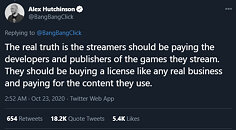Gaming is a different beast than music imo. The amount of time invested really does make a difference. I listen to a few songs it takes 12 minutes, I play a game for 2-150 hours. Also, if your a music person, you would be smart to contact the popular game streamers to play your music for free - they would buy it. That is the nature of everything now, influencers. I mean I have bought headphones because of ZEOS reviews in past, he doesn't pay companies to send him headphones, they send them because they know they will sell more.
But that goes both ways. If a song plays on the radio for ~3 minutes, you listen to it for free for the same time, and the station pays a royalty to the rightsholder for the right to distribute the music. This might lead you to buy the music or go to a concert, but more than likely not - hence why royalties like these matter. If a streamer plays a game for 100+ hours, you still get to watch that game being played for that amount of time if you want to. Whether or not you buy the game and how much time you spend playing it has little if any bearing on the relation between the streamer and the rightsholder. The argument that "but it's free advertising" is the same argument that says that artists don't deserve to get paid when other people profit from their work - like when T-shirt stores steal artworks and print them for sale, or when advertising companies (
so many times!) steal people's work off the internet and re-use it in ad campaigns. One thing is if this is voluntary on the part of the creator, but your argument makes no distinction between the creator initiating this themselves or the streamer doing so, so it essentially saying that creators need to accept that people make for-profit use of their products whether they like it or not. That is a
deeply problematic argument.
The only real difference I see from traditionally licenced media - which admittedly is a major one - is that unlike a piece of music, literature, film, TV, etc., each playthrough of a game is a specific realization of the (near infinite) possible playings of that game. Or put more simply, the game we see played on a stream isn't the product of the developer alone, but rather a collaborative effort between (among others) the developer and the streamer, and removing either from the relation would make the thing in question (a game stream) impossible. Traditional media are open for interpretation, can be presented and realized in many ways, and are of course affected by the medium through which they are experienced, but they still have a somewhat fixed form, while claiming the same for a game is much more difficult. This could at least be an argument for
lower royalties compared to more fixed media like music where the effort is more centered around the creator.
(Of course music royalties are massively skewed towards record labels, and artists get
far less than they should, but that's another debate entirely.)
IMO, game developers should form a rightsholder organization similar to what record labels have and start demanding royalties from streaming platforms. But these need to be reasonable, and they need to differentiate between ... let's call it commercial and hobbyist streaming (as well as similar distinctions for other fair use exemptions such as analysis or criticism). Hobbyists making little to no money off their work should obviously not need to pay royalties for streaming games, nor should reviewers, critics, people doing content analysis, or anyone else whose use of the game falls outside of what could be termed "professional streaming". And this would obviously need to
not be policed by bots, as we all know what a recipe for disaster that kind of system is.






 , though Stadia is pretty much dead already.
, though Stadia is pretty much dead already. i still have my original keys, just need the original downloads. really hate blizz for doing that.
i still have my original keys, just need the original downloads. really hate blizz for doing that.
